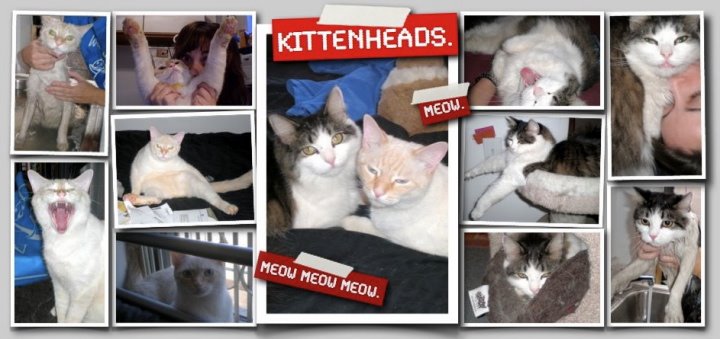This article is from The Wall Street Journal and I've put it here so that, when it finally gets archived, I won't get left without it. Thank you, Mr. Rutkoff.
| |||||
With 'LOLcats' Internet Fad,
Anyone Can Get In on the Joke
August 25, 2007
Eric Nakagawa was between jobs last January when he came across a funny picture while surfing the Web: a high-strung cat with an open maw making a garbled request for a cheeseburger.
Mr. Nakagawa couldn't really say why he found the picture so funny. He passed the digital photo to a friend, and on a whim they created the Web site "I Can Has Cheezburger," borrowing from the caption. Something about the strange image or syntax struck a chord with readers. "We started getting hits," he said in a phone interview from his home in Hawaii. "I was shocked."
He shouldn't have been. The out-of-work computer programmer had stumbled on to one of the bigger inside jokes on the Internet, and at the same time, stumbled into his next job.
Mr. Nakagawa's simple Web site has become the center of the "LOLcats" phenomenon, a booming online subculture built around digital images and deliberately bad grammar. There's not much to it: Take a digital photo -- often one of household pets, particularly cats -- and purposefully place misspelled text on top. Anyone with elementary skills in Adobe's Photoshop or Microsoft's Paint software can make their own.
Nearly nine months after launching icanhascheezburger.com, Mr. Nakagawa's site receives around 200,000 unique visitors and a half-million page views each day, according to Mr. Nakagawa.
Visitors can browse a sprawling gallery of lolcats, vote for their favorites and post comments. Mr. Nakagawa says he receives up to 500 submissions a day, thanks in no small part to his site's tool that helps people build their own. He says every entry is screened for merit and originality before earning inclusion.
Only 12 or so submissions make the gallery a day. "It's ridiculous," Mr. Nakagawa admits, "but we do go through all of them." He certainly has the time. Revenue from ads on the site is "more than enough to pay my bills."
A Lesson in Lolcats
It's possible to use the Internet every day and never encounter a lolcat. Here, for beginners, is an archetypal example:
If lolcats were jazz music, the refrigerator-invading cat would be a standard -- an example of the art form that every practitioner is assumed to recognize and understand. And much like a well-known melody, the "IN UR …" phrasing is a recurring source of riffs and references within the lolcat community.
Thus, the fridge setting is changed to an office environment:
Before long, the "IN UR" set-up is applied to Schrodinger's cat, a paradox used to illustrate quantum mechanics:
Despite its impressive viral spread and apparent staying power, the lolcat fad is just the latest online thing to make people laugh. It'd be tough for even the most dour person to keep a straight face when confronted with a walrus-and-bucket example, which has spawned an offshoot genre of its own known as "lolrus."

What makes lolcats appealing is that it's simultaneously obscure and accessible. It's an inside joke told in an online lingua franca, but with a bit of effort anyone can become an insider.
"An in-joke used to be constrained by geography and who you knew socially," says Anil Dash, occasional lolcat critic and vice president of Six Apart, which creates several popular blog-software programs. "This is a very large in-joke" that blurs the old distinction "between Net geeks and the normals," he says.
An essay on Mr. Dash's blog, in which he analyzes what he terms "kitty pidgin" -- the misspelled and mixed-up phrases used in lolcat captions -- has been read over a million times since April, he says. Beyond its idiosyncratic grammar, the lolcats fad has also helped popularize oddball online expressions like "Oh Hai!"
What helps give lolcats staying power is that the in-joke evolves freely. "People respond to each other's efforts. What succeeds and is funny inspires the next round," Mr. Dash says.
There aren't just cats, dogs, rabbits and other animals speaking in broken English, but presidents, Star Trek characters and rappers. (Scott Beale, who writes the blog "Laughing Squid," created a helpful taxonomy of the many lolcat offshoots.)
This image, for example, plays on the viewer's familiarity with the classic walrus example to make a joke about Teddy Roosevelt:
Another common lolcat caption trope is to declare some object invisible, as if it's been erased from the photo:
And familiarity with the invisible gag, as well as the classical precepts of capitalism, makes this otherwise unremarkable image of the economist Adam Smith, taken from a "lolphilosophers" pool on Flickr, much more:
What may ultimately keep lolcats from expiring as a meme is the pictures themselves have widespread appeal.
"Those ladies who work at the reception desk in your office, they might be sharing these lolcats with their friends," says David McRaney, a 30-year-old from Mississippi who has written an interesting lolcats history. "And some of these references, maybe they don't really get it. But it doesn't matter. 'Im in ur fridge eatin your foodz' is funny to everyone, even if you don't get the reference."
Write to Aaron Rutkoff at aaron.rutkoff@wsj.com



No comments:
Post a Comment